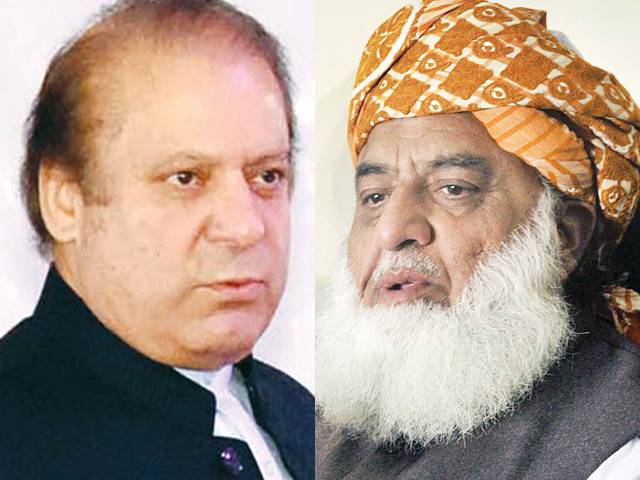ISLAMABAD - Jamiat Ulema-i-Islam (JUI-Fazl) chief Fazlur Rehman has developed serious differences with the government on the way, he claims it is “selectively” implementing the National Action Plan (NAP) and the rulers’ intention to extend the tenure of the military courts in Pakistan.
Sources aware of the developments informed The Nation that in the last meeting with Prime Minister Nawaz Sharif, which had taken place a few days ago, the JUI-F Chief, Maulana Fazlur Rehman, had made it clear to him that his party would not support any move to give extension to the military courts in Pakistan.
The military courts were given constitutional cover through 21st Constitutional Amendment passed in the beginning of January 2015 for a period of two years, and now the timeframe for these military courts would be expiring and would require grant of extension through parliament, if the government wanted to keep these courts intact.
Otherwise, these courts would seize to exist after lapse of the timeline given to these courts through the 21st constitutional amendment.
Sources in the parliament informed The Nation that the ruling PML-N wanted to extend the period for those courts for another two years and there was also proposal to keep those courts on a permanent basis till the time the menace of terrorism was weeded out from the society.
Sources in the JUI-F confirmed to The Nation that party chief Fazlur Rehman had made it clear to the government that this time his party would come out in protest, if any attempt to make the military courts permanent was made through a constitutional cover.
Sources further said that the JUI-F wanted a debate in the parliament on the efficacy of those courts and the achievements made during the two years of their existence before considering grant of any extension.
The JUI-F chief was of the view that instead of running a parallel judicial system the government must focus on strengthening the existing system to make it deliver.
It is pertinent to mention here that the JUI-F along with Jamaat-i-Islami (JI) had abstained from voting on the 21st Constitutional Amendment but the reason of their staying away from the process was not the formation of the military courts but the definition of terrorism and its linkage with religion.
Though the JUI-F chief was appeased by the ruling PML-N that the concerns of the party would be addressed by adopting another amendment to rectify the things in 21st Constitutional Amendment but he was still waiting for the fulfilment of that commitment made with him, a source in the JUI-F informed The Nation.
The JUI-F was also having serious issues with the ruling PML-N on the federal government’s policies toward Khyber-Pakhtunkhwa government.
Both the coalition partners also have differences over the Fata reforms as the JUI-F is opposing the merger of the area in Khyber-Pakhtunkhwa and wants see its separate identity intact.
Parliamentary sources said that the JUI-F leadership was just exerting pressure on the government to get some of its demands met, and the dissent to the military courts issue was just for the consumption of the diehard vote back of the party, particularly in Khyber-Pakhtunkhawa.
These sources said that the JUI-F chief was unhappy with the prime minister for noncompliance of the coalition agreement and not giving them the promised ministerial slot to the party vacated by its member Maulana Abdul Ghafoor Haideri.
Similarly, he is also putting the stake on the slot of the Council for Islamic Ideology (CII) chairmanship, which was vacated by the party’s central leader Maulana Mohammad Khan Sheerani in the second half of last month.






